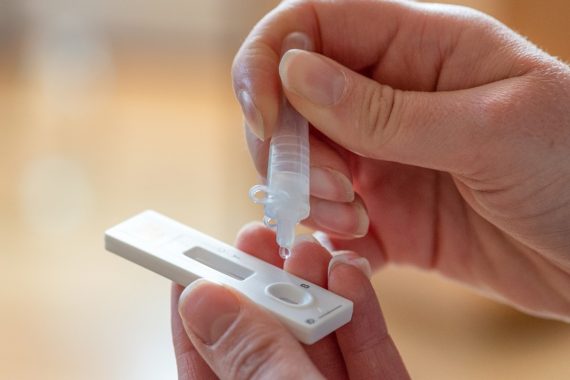Covid case isolation period reduced to seven days with negative LFTs

The self-isolation period for people who test positive for Covid has been reduced from 10 days to seven in England.
The Government said this was in part to reduce pressure of absences on public services.
It applies to people who no longer have symptoms and who twice test negative on lateral flow tests on day six and seven of their isolation period, 24h apart, the UK Health Security Agency (UKHSA) said.
But the Government ‘strongly advised’ that those who leave isolation early take ‘other precautions’, including limiting contact with other people, washing hands regularly, wearing a face covering and working from home.
The guidance for health and social care workers – including GPs and practice teams – is the same with some additional mitigations, including continuing to test negative with daily LFTs until day 10.
UKHSA self-isolation guidance for healthcare workers
If a staff member receives a positive SARS-CoV-2 PCR test result, they must complete a period of self-isolation. The isolation period includes the day the symptoms started or the day their PCR test was taken if they do not have symptoms, and the next 10 full days.
Staff may be able to end their self-isolation period before the end of the 10 full days by undertaking an LFD test on the sixth day and seventh day of their isolation period (24 hours apart). If both these LFD test results are negative, they may return to work on day 8 under the following conditions:
- the staff member should not have any Covid-19 symptoms
- the staff member should continue to undertake daily LFD tests on day 8, 9 and 10 of their isolation period. If any of these LFD test results are positive the staff member should isolate and should wait 24 hours before taking the next LFD test
- if the LFD test is positive on the 10th day, daily LFD testing should continue and the staff member should not return to work until a negative LFD test result is received
- on days the staff member is working, the LFD test should be taken prior to beginning their shift, as close as possible to the start time
- the staff member must continue to comply with all relevant infection control precautions and PPE must be worn properly throughout the day
- if the staff member works with patients or residents who are especially vulnerable to Covid-19 (as determined by the organisation), a risk assessment should be undertaken, and consideration given to redeployment for the remainder of the 10 day isolation period
If any of the above cannot be met, the staff member should not come to work and should follow the stay at home guidance for the full 10-day period.
Source: UKHSA
UKHSA said the new guidance – which applies in England only – will enable the self-isolation period to be reduced ‘in most cases’.
Unvaccinated contacts of positive cases must still self-isolate for a full 10 days after their date of exposure to the virus, it added.
The new guidance reflects the ‘latest evidence on how long cases transmit the virus for and supports essential public services and supply chains over the winter, while still limiting the spread of the virus’, UKHSA said.
Evidence – which is yet to be published – suggests a seven-day isolation period with two negative LFT results has ‘nearly the same protective effect as a 10-day isolation period without LFD testing’ for those with Covid, it added.
It also said studies have now shown that lateral flow tests are ‘just as sensitive at detecting the Omicron variant as they are for Delta’.
UKHSA chief executive Dr Jenny Harries said: ‘Covid-19 is spreading quickly among the population and the pace at which Omicron is transmitting may pose a risk to running our critical public services during winter.
‘This new guidance will help break chains of transmission and minimise the impact on lives and livelihoods. It is crucial that people carry out their LFD tests as the new guidance states and continue to follow public health advice.’
Health secretary Sajid Javid added that the Government wants to ‘reduce the disruption from Covid-19 to people’s everyday lives’.
The requirement was replaced with a negative PCR and then daily LFT tests for ten days – with isolation only on testing positive or developing symptoms – for those who are fully vaccinated.
Those who are not fully vaccinated must stay at home and self-isolate for 10 days.
It followed Pulse revealing that the guidance was briefly stricter for GPs than for the general public, following the relaxation of the same measure for the public earlier in the week.
Meanwhile, the Government last week announced that it would ‘double’ capacity for Covid testing after days of problems.
Pulse October survey
Take our July 2025 survey to potentially win £1.000 worth of tokens

Related Articles
READERS' COMMENTS [1]
Please note, only GPs are permitted to add comments to articles










But you can have a sick note for 1 month. Post viral fatigue.